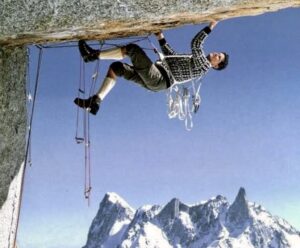Earlier today, in Tokyo, Dohi Keita crossed the length of the pin-drop-quiet Olympic stadium, holding a corner of Japan’s flag. Watching intently was Emperor Naruhito. Keita is 20 years old. His discipline: sport climbing.
For the first time, climbing is among the sports competing at Tokyo’s 2021 Olympic Games. It will be exciting to watch 40 young sports climbers (20 men and 20 women) competing in the Lead, Speed, and Bouldering disciplines.

Know who this is? Hint: He’ll be in Tokyo, but has climbed quite a lot before. Photo: Olympics.com
Speed climbing pits two climbers against each other, both climbing a route on a 15m wall. In Bouldering, athletes scale a number of fixed routes on a 4.5m wall in a specified time. In Lead, athletes climb as high as possible on a wall measuring over 15m in height within a specified time.
Each climber must compete in all three disciplines, and you get the final ranking by multiplying an athlete’s placement in each discipline: The ones with the three lowest scores win the medals.
This link explains the Olympic rock-climbing rules more thoroughly. For an even deeper dive, this Outside/Climbing piece is excellent.
Not everyone’s happy
Although it seems like generally good news for the sport, its inclusion in the Olympics has raised eyebrows among hard-core climbers. They don’t look on climbing as a sport at all.
“Some think climbing is more of a lifestyle or more of an adventure,” Alex Honnold points out in the video interview below. Honnold’s own point of view is more open. He started in a climbing gym so he recognizes that at least part of climbing is a sport. He is also personally psyched to watch the Games.
A similar controversy will occur in the next Winter Olympics, in 2026 in Milan-Cortina. Here, Ski Mountaineering (Skimo) will have its debut. Kilian Jornet, who first made a name for himself at Skimo competitions, admits that he has mixed feelings.
“As a sports fan, I love watching big events like the world championships and the Olympic Games, where you can smell the pressure in the air,” says Jornet. “Winning a gold medal is something every kid dreams of…I see how becoming an Olympic sport can help [its] development in different countries and get national teams more financial support.”

Kilian Jornet. Photo: Kilian Jornet
“On the other side, I’ve seen how often a sport changes its format until its core values are denatured…I hope that the mountaineering aspect that is the heart of the sport doesn’t disappear in order to become more spectator-friendly.”
Olympic climbing: a start
While the mountaineering part of Olympic ski mountaineering may be hard to reconcile, sport-climbing on artificial walls is easier to grasp as a formal sport. The competitions that we will watch over the next few days will be closer to gymnastics than to classical mountaineering. There will be no summit, no objective dangers, no uncertainty except the final score. But there will be emotion, displays of skill and strength, and the iron will to be the best.
In addition, the Olympics will showcase climbing to all kinds of audiences, including potential sponsors. Spectators may be curious or thrilled enough to sign up at a climbing gym afterward. Many of those may eventually feel the call of real rock faces.
After all, Alex Honnold started by tackling colorful PU holds screwed into a wall panel and graduated to facing eternity on his solo big-wall climbs. And Tokyo 2021 will host some well-known “natural rock” climbers. Adam Ondra, for example, will strive to win a gold medal for the Czech Republic. There is no limit, but there is always a beginning.






